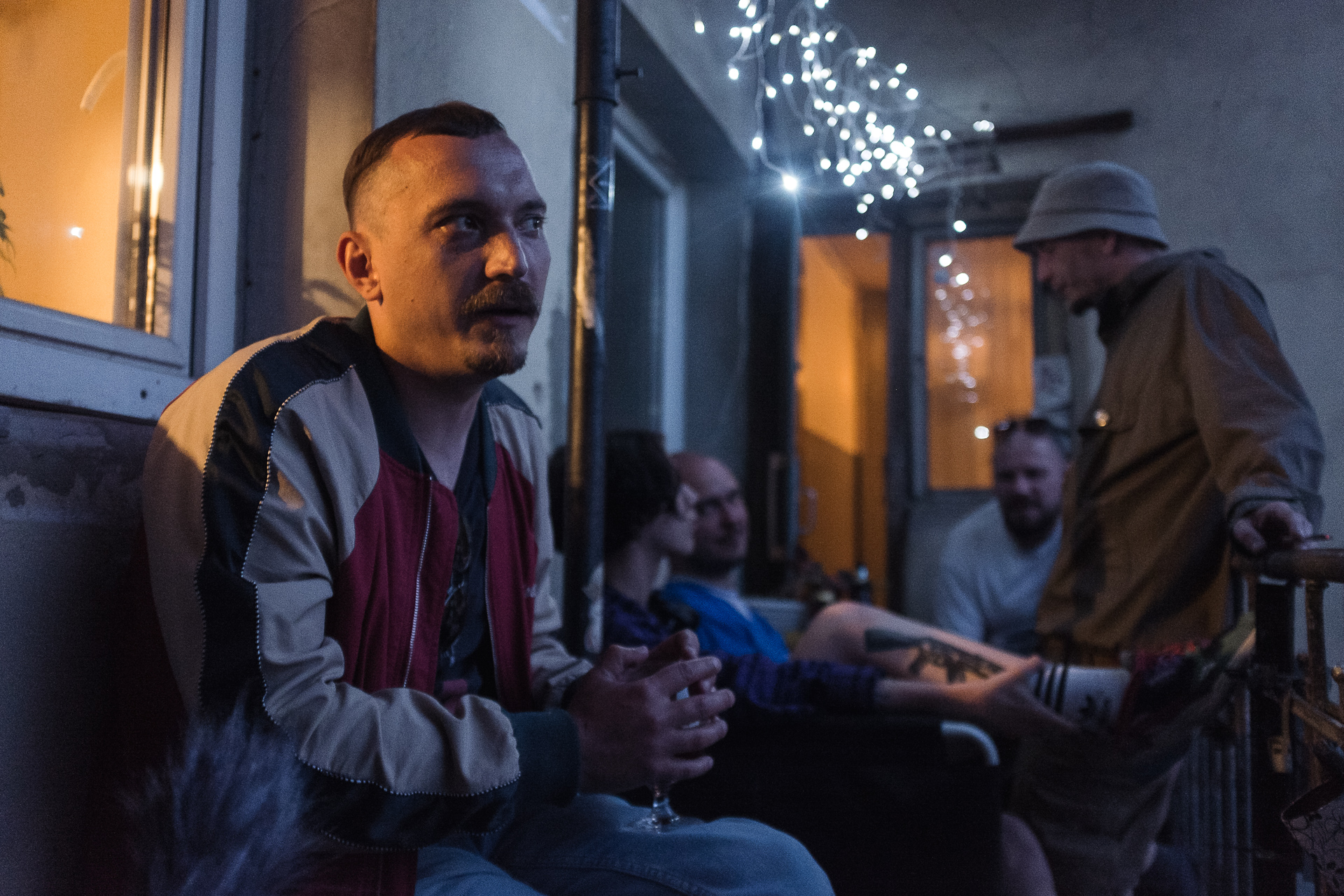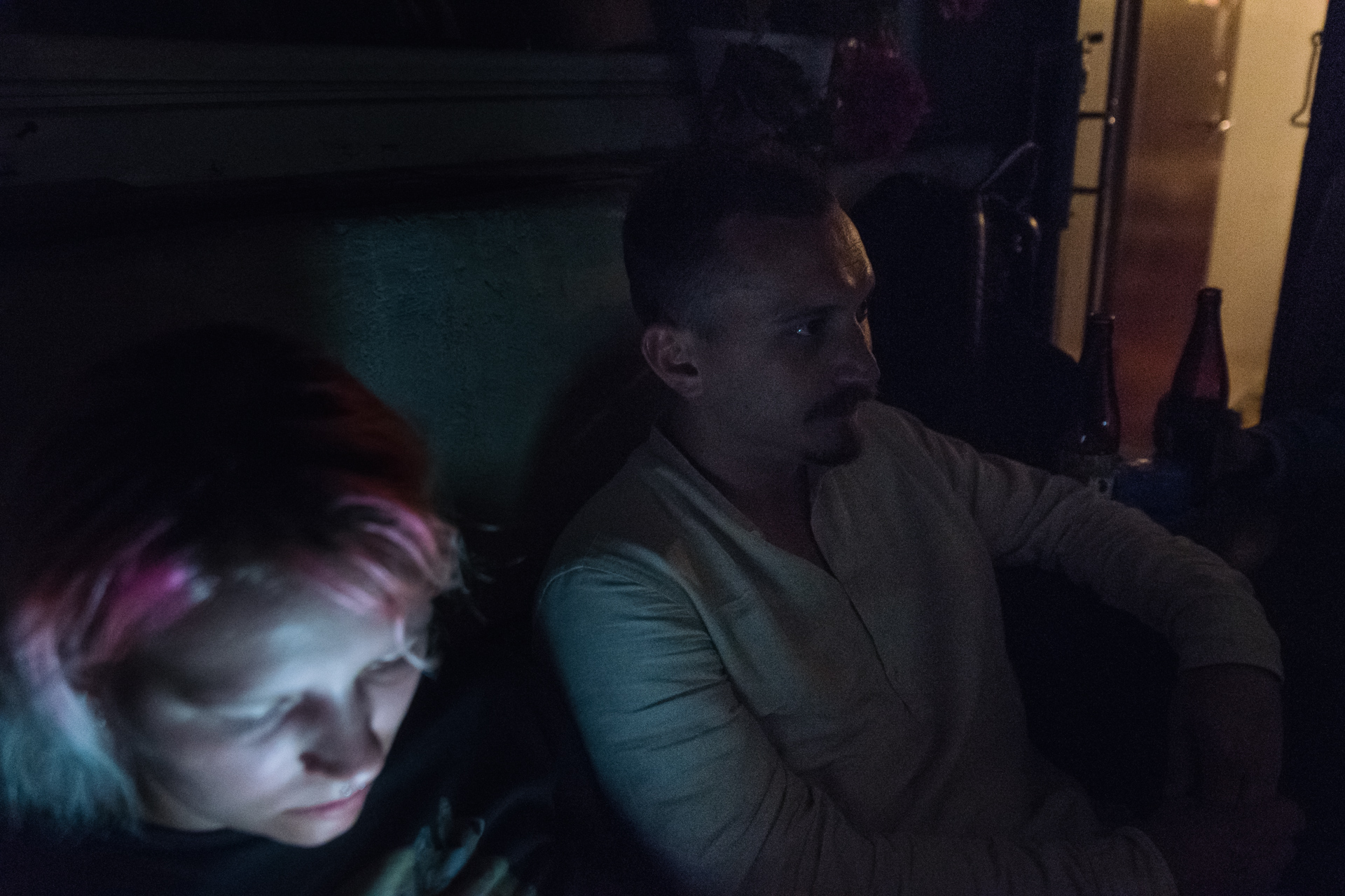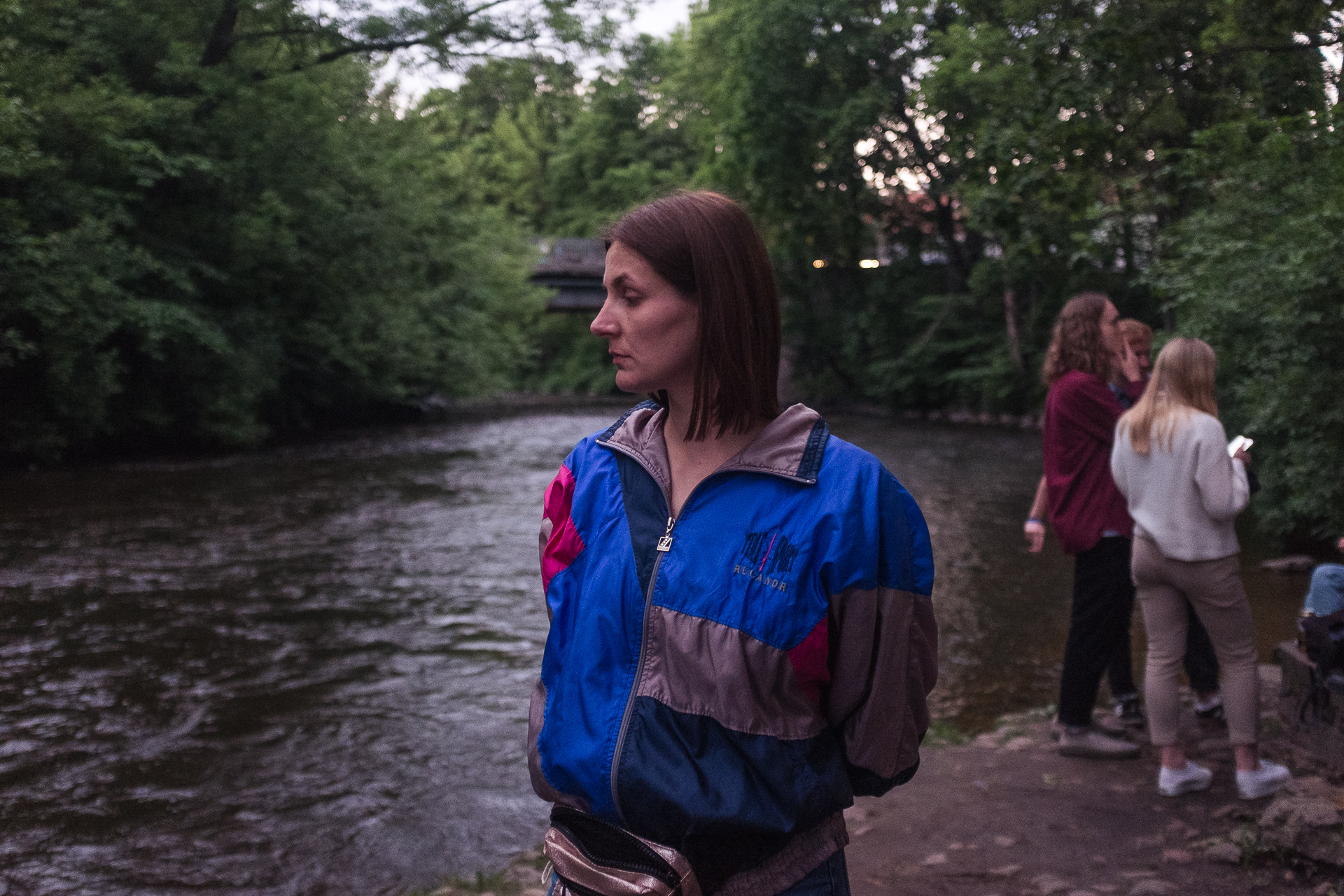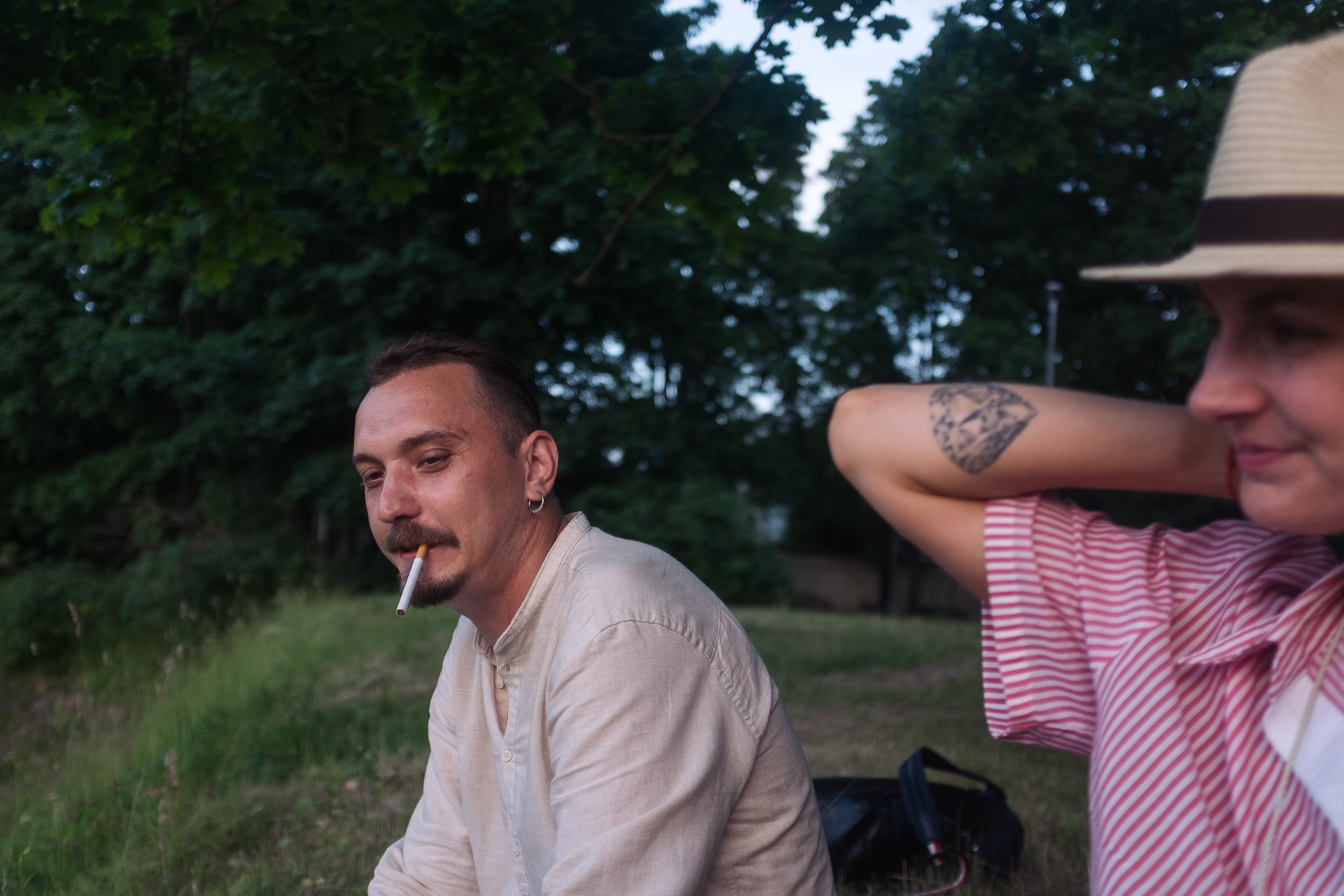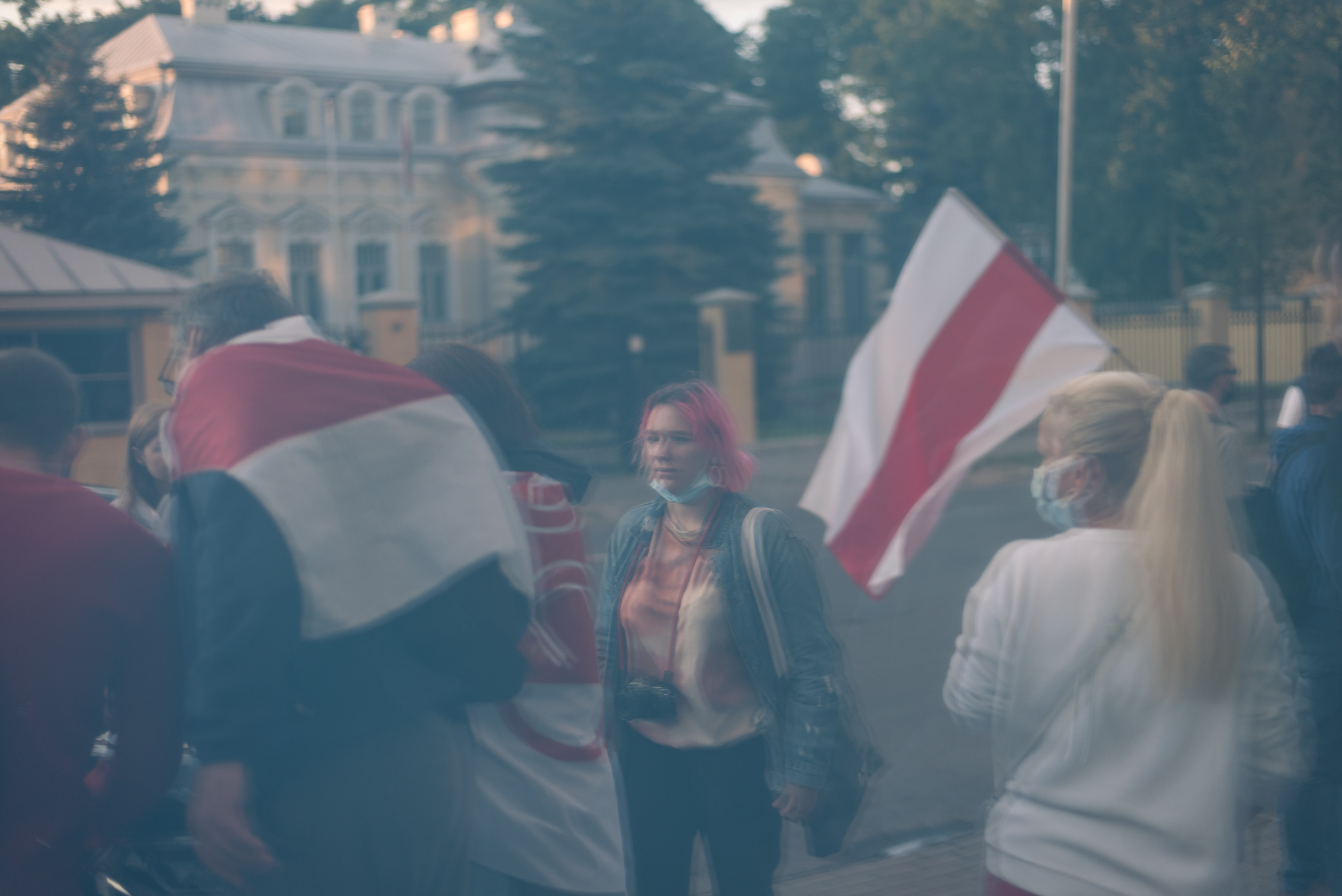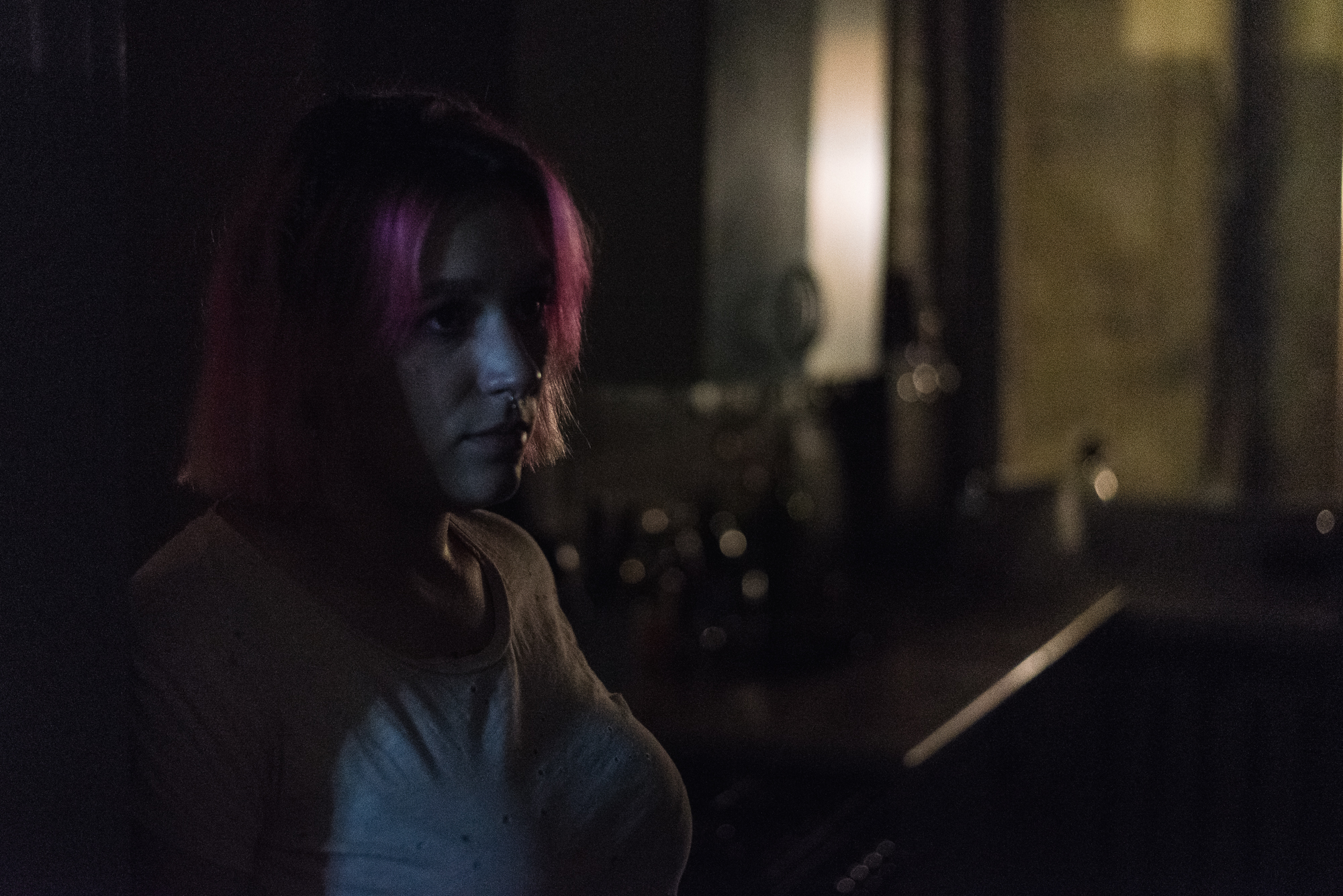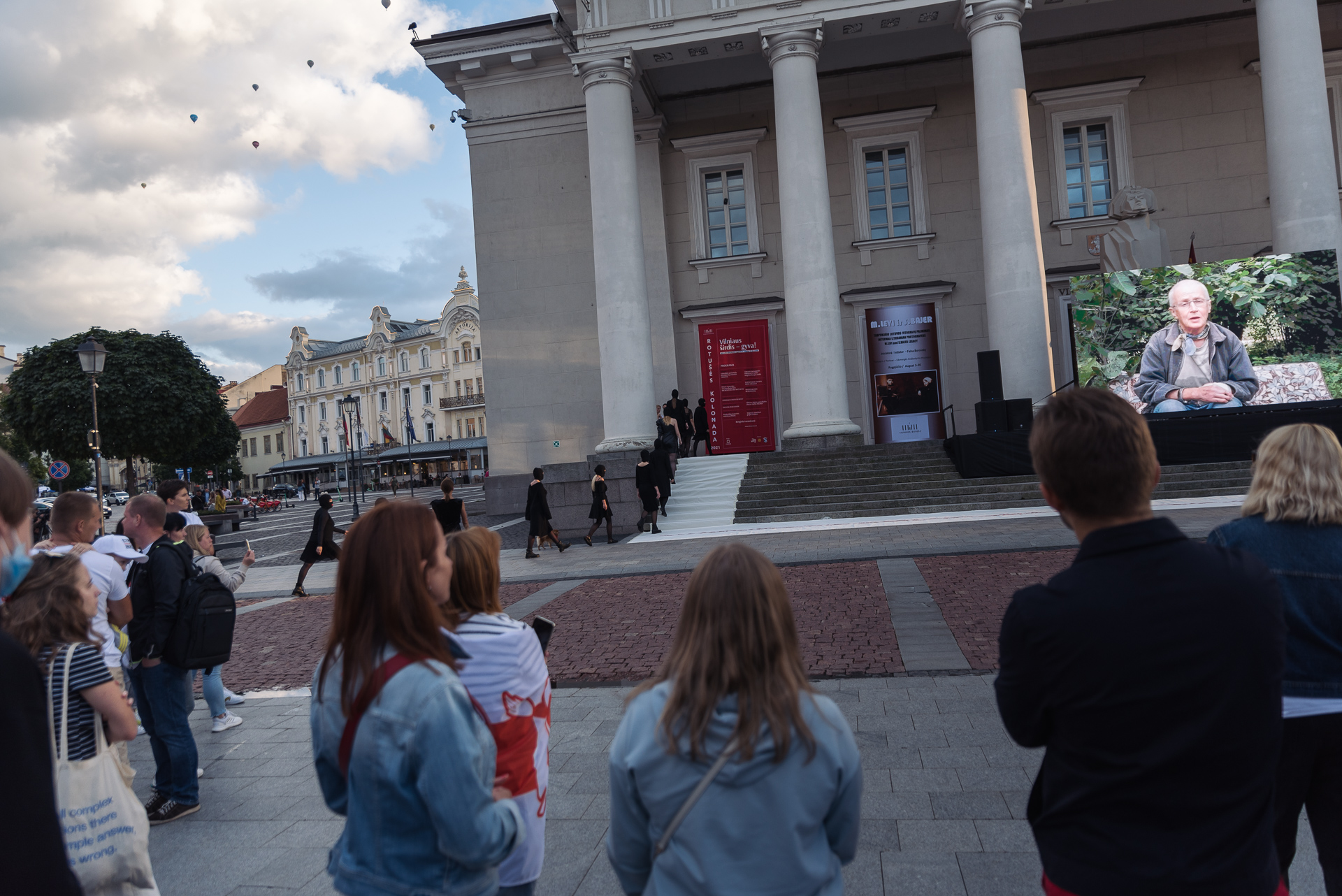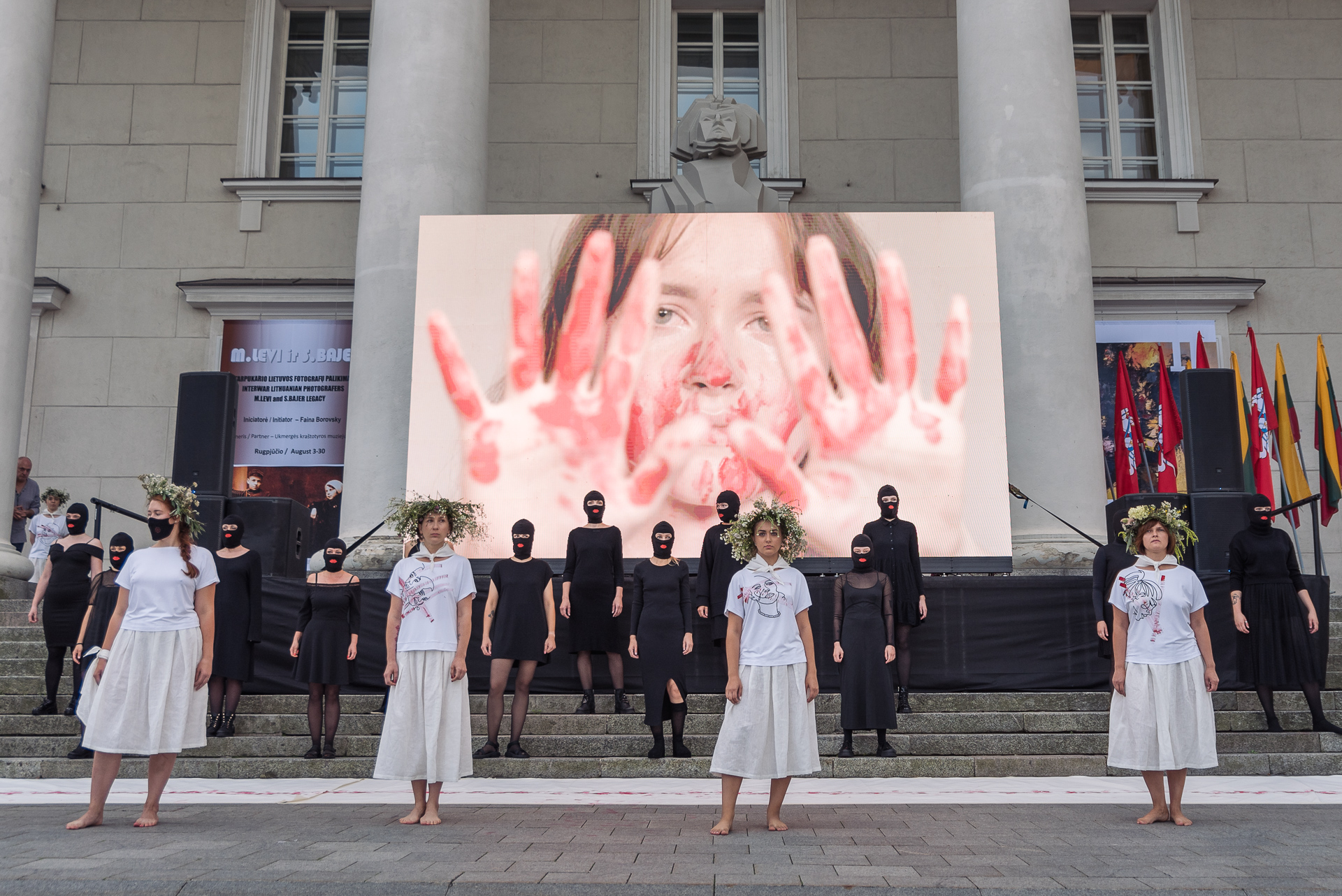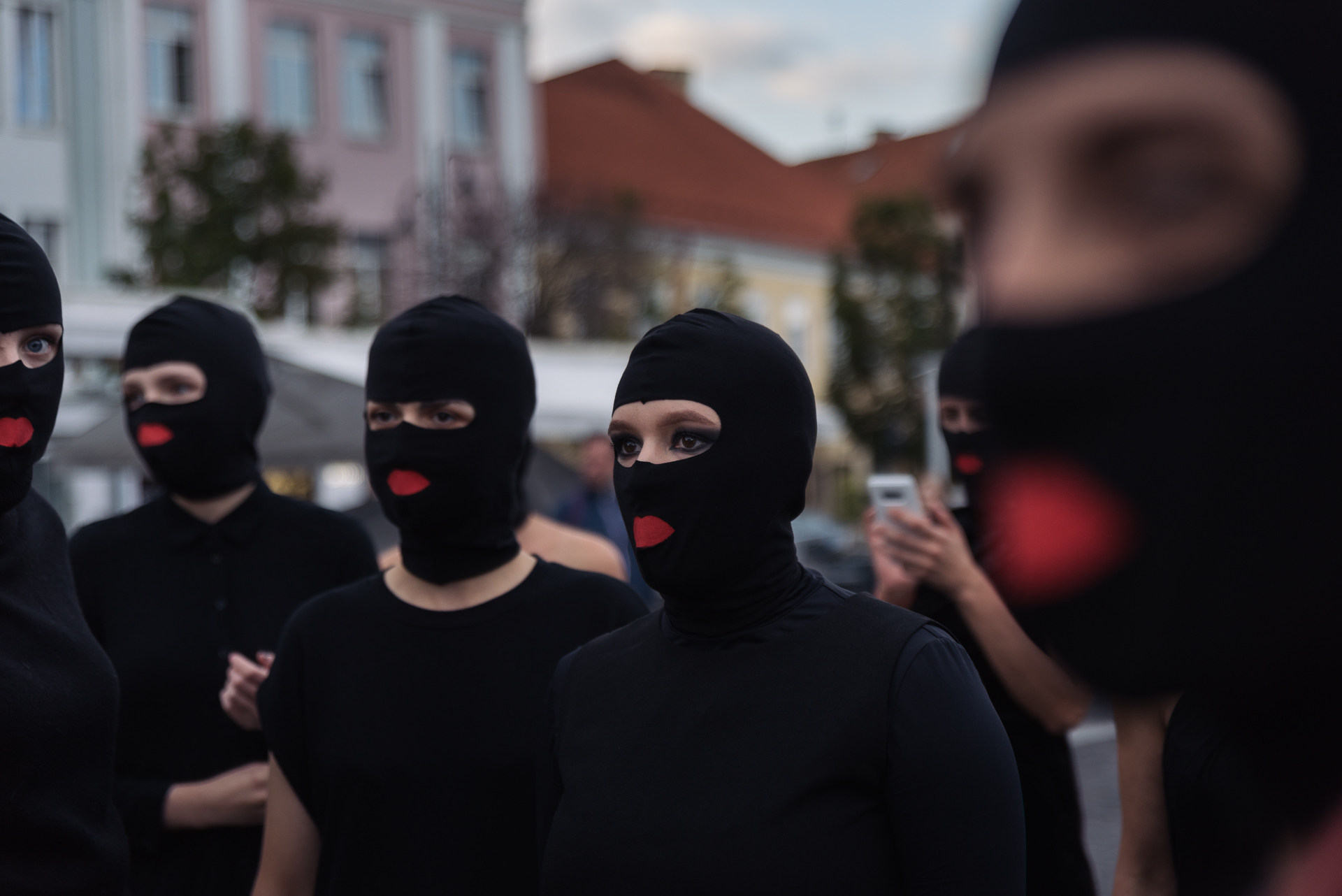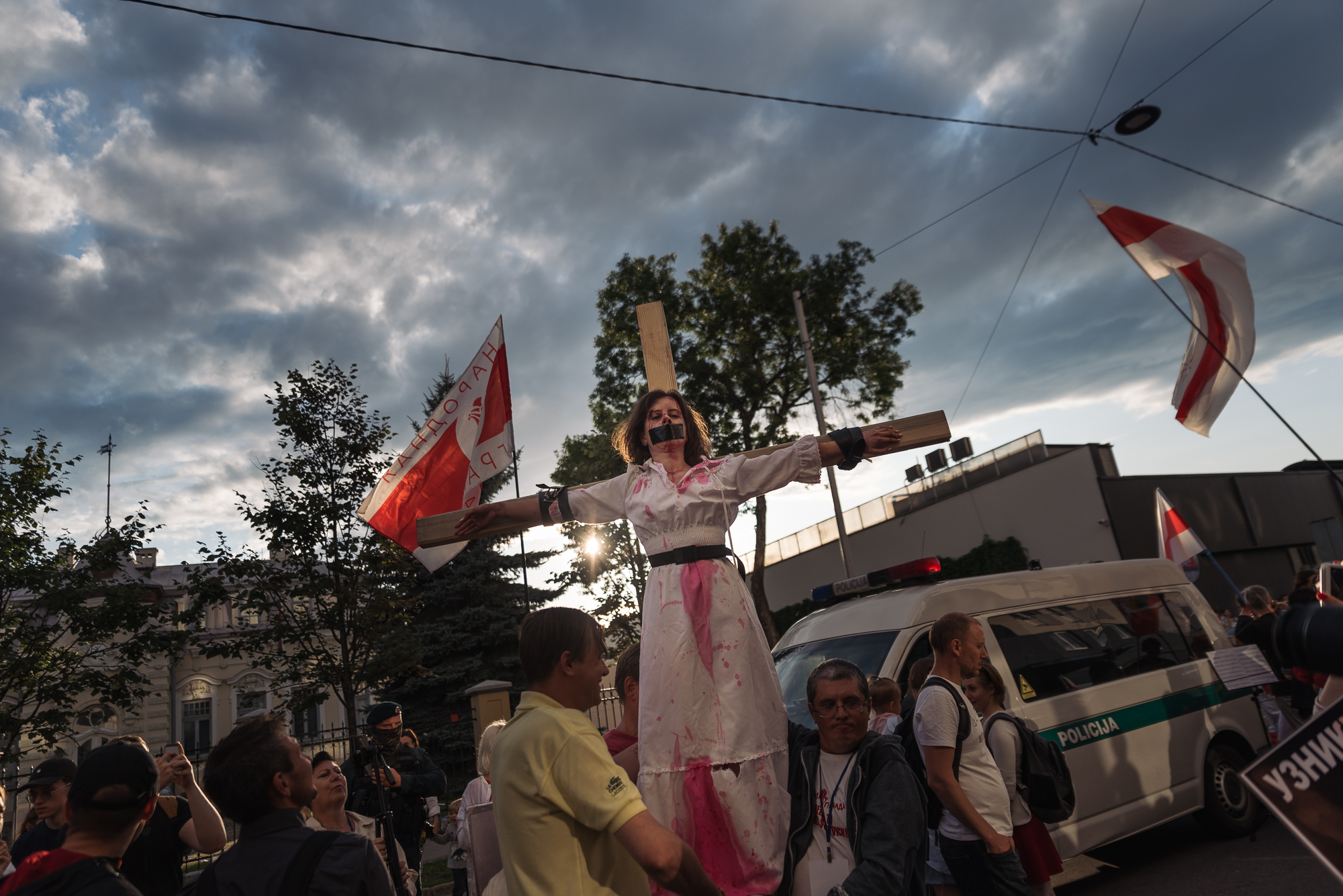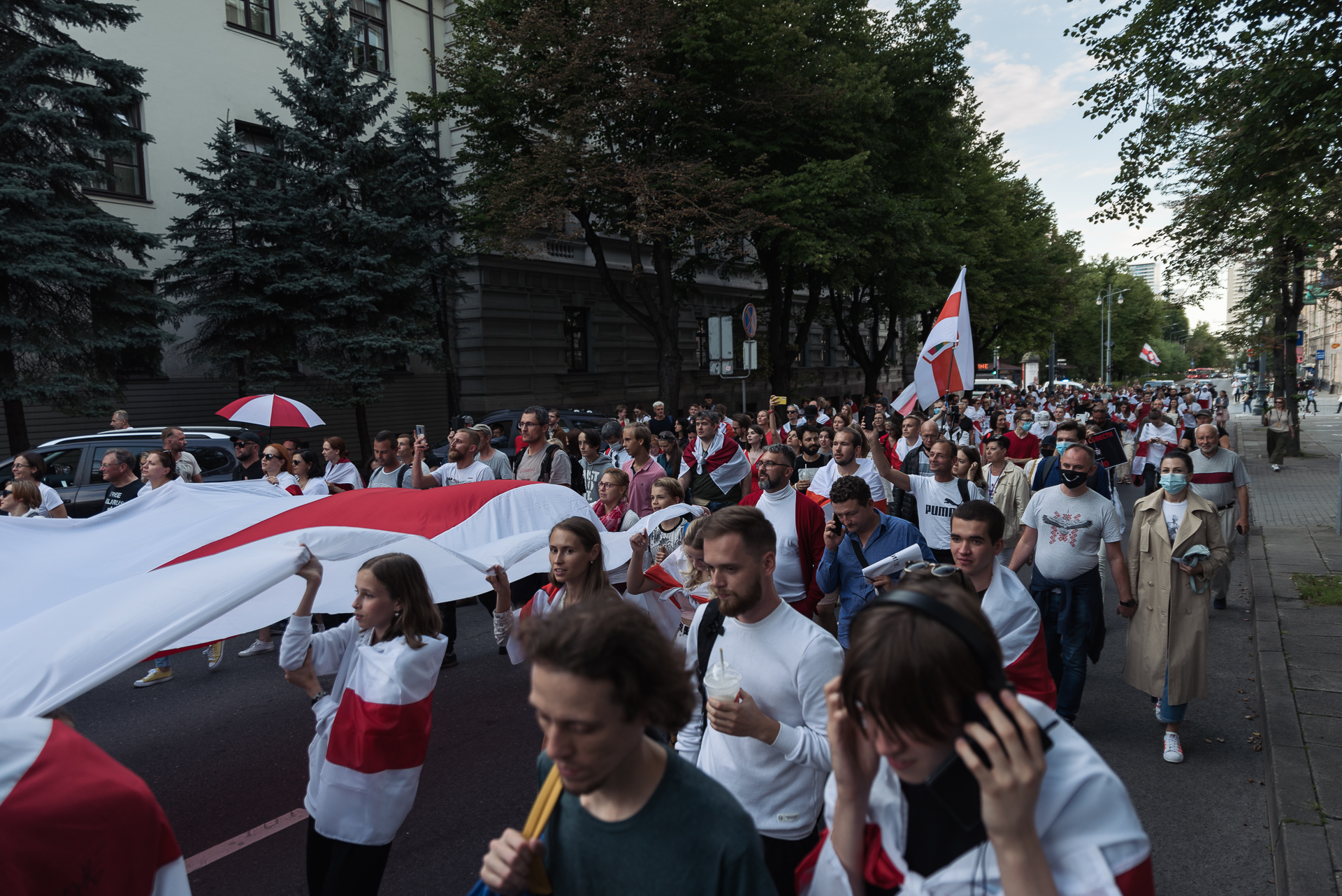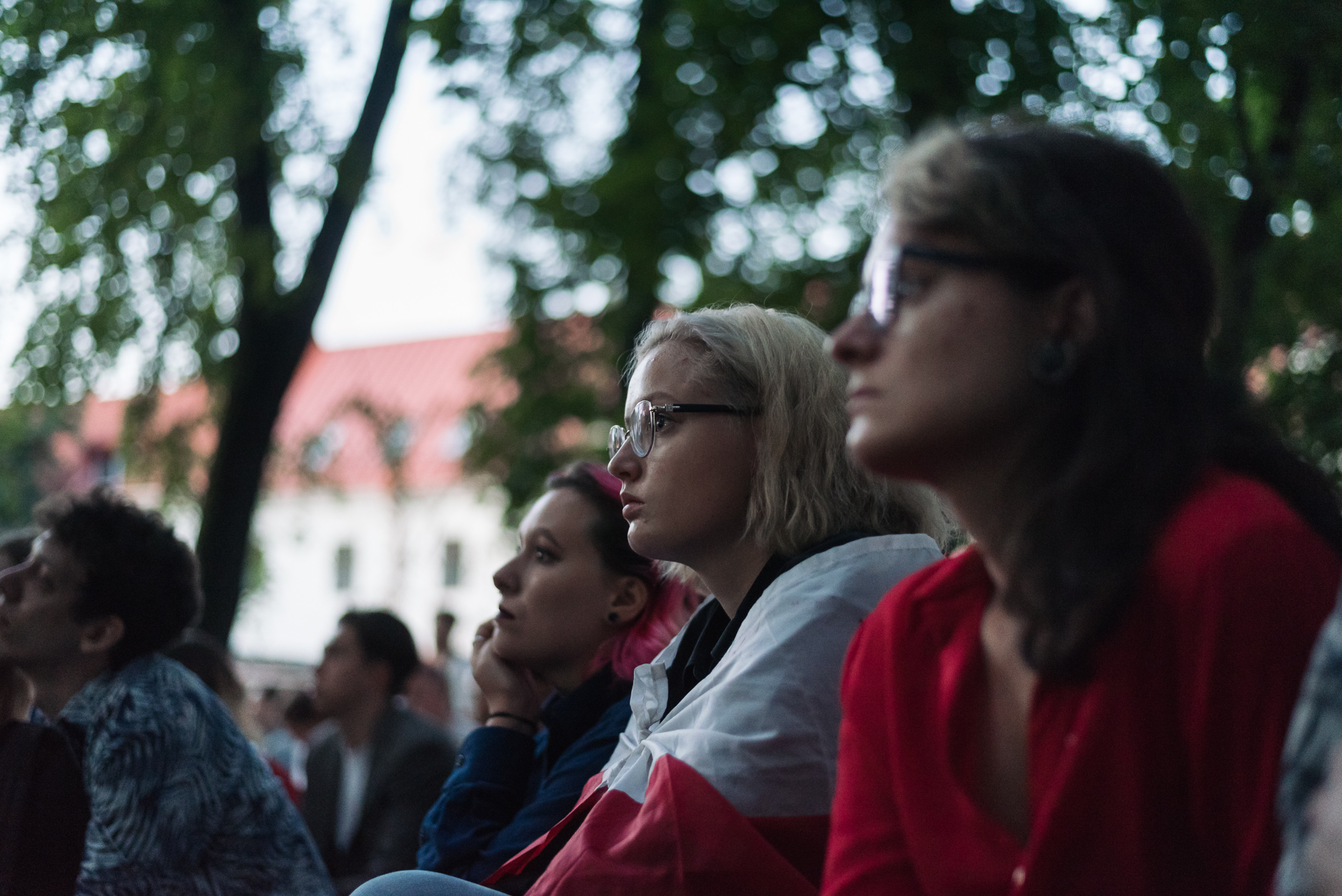Sasha and her girlfriend Dasha, both in their early 20s, arrived in Lithuania in December 2020.
Sasha was one of the student protest leaders in her communication faculty at the Belarusian State University. She was also a member of the opposition Belarusian Students’ Association and responsible for managing a Telegram channel that helped repressed students.
In December, the crackdown intensified; the KGB was looking for Sasha. Four of her fellow students at the university had already been detained. Sasha’s parents urged her to flee.
She packed two suitcases, two backpacks, and a huge plush toy – a shark she gave Dasha during their one-month anniversary. They have known each other for 11 years.
In Vilnius, they found home in a so-called commune centred largely around Alexey Yevtushik, a 36-year-old from Minsk.
Dasha waves at Olga, who had lived briefly in the same community together with her son and daughter. Read more about Olga and her work in Part One.
He was the first to arrive in Vilnius on August 26, 2020, followed by his girlfriend Anna Domorenok some weeks later. Then, Lidya Elcova, his old time friend, came.
The word commune, although fitting, is rarely said by the relocants other than as a joke. However, they recall many other such clusters springing up in Vilnius, as well as outside the Lithuanian capital.
Some had been started by diaspora activists immediately after the elections, when they were faced with the need to provide temporary housing to the growing number of arrivals as repressions in Belarus picked up pace. Other clusters, meanwhile, grew organically.
Alexey climbs the winding staircase, past the other flats occupied by Belarusians. He stumbles onto the landing, with a shared balcony in front. Already, some of his friends are there, chain-smoking and listening to Lithuanian and Russian rap.
“Adventure time,” he smiles.
The community that has grown around him include Anna, Lidya, as well as Sasha and Dasha and several other relocants.
Olga, with her son Gleb and daughter Nastya, had also lived there briefly.
“We are all from very different fields,” says Dasha. “If we hadn’t ended up [in Lithuania], we would have never met in our lives.”
They show pictures from the same rallies in Vilnius, pointing at their current housemates caught in the same frame – strangers who would soon become their friends.
Another connecting line weaves through the infamous Okrestino prison in Minsk. There, thousands of people detained on the first nights of post-election protests faced what human rights organisations described as widespread tortures. On August 14, five days after the elections, hundreds of them were released, appearing at the gates, bloodied with bruised and broken limbs.
A camp sprung up outside the prison gates, linking the former detainees with families and providing medical help. Sasha and Dasha were there doing their share, volunteering 28 hours straight to help register and process those released.
Alexey, meanwhile, was one of the Okrestino survivors leaving the gates.
“I started thinking about my life. Was it enough?”
On August 10, 2020, during the second of his three nights inside a six-men cell filled with 64 people, the mood changed. The prison guards stopped talking, their words echoing commands and orders replaced by the sound of blunt hits and screams.
In the oxygen-starved room, people were laying in layers, with only one or two being able to listen through a tiny window and a crack in the door to hear what’s coming their way.
“One hit – a person screams, a second – he screams louder, a third – silence,” recalls Alexey.
“I remember asking people around me - do you know what they’re doing? Are they doing what I think [they are doing]? Someone said yes, I’m sure they’re killing. A few people around started to cry, [some started] to sing.”
“[Prison guards] started pulling people from cells on our floor. They were getting closer and closer [to our cell]. Then I said, ‘I don't know what will happen, but you probably have just a short time to think about your life. Probably, it will finish soon.’”
They counted the minutes pass by.
“I wasn’t afraid, I simply knew that I had practically no time left. I started thinking about my life. Was it enough?”
He closed his eyes and remembered his girlfriend, Anna, who was calling every Minsk prison and police station trying to locate him.
“I answered to myself ‘yes’ – not every [person] had such an interesting life like myself.”
“And then everything simply finished when the [officers] approached our cell.”
The prison guards never entered his cell. Until this day, he doesn’t know what made them stop.
Alexey did not leave Okrestino unscathed. The prison guards would strip the detainees down to their underwear and arrange them in the square – Alexey and the others would have to pick several people who could leave the line up. The rest would be beaten.
Other abuses at the prison, recorded by organisations such as Human Rights Watch and Amensty, detail systematic tortures, including rape and severe beatings.
The news of what was happening inside only got out after the gates of Okrestino had opened.
Some did not make it out – at least several people who were detained or had disappeared during the protests would later be found dead, their bodies discarded in a forest or brought, in vain, to intensive care units.
After being released, Alexey joined a Telegram group with the others named after their cell number – Kamera 12. He introduced himself by his nickname, Cyborg.
“Four of them have already moved [from Belarus], one has gone to Russia”, while another has gone to Bangladesh, says Alexey. “He probably decided to go far.”
He is still in touch with just a few of them, with the group chat rarely being used anymore besides someone posting an update about where they are, or helping each other flee. “Very good people, but also very different people,” says Alexey, adding that the people there included pensioners and teenagers.
In Vilnius, Alexey is never alone, surrounded by friends, usually gripping a can of coke in one hand, a cigarette in the other.
Alexey with two local Lithuanians.
A coke was also the first thing he asked for when he left Okrestino, he says.
At his Vilnius home, Alexey has seemingly taken on a caring role for some of the Belarusians there – from helping sort out documents at the Migration Department, to finding medical help. “For me, [trauma effects] have not started or are not so critical, for others, they have more problems. [...] I see it on Anna, I see it on Lidya, I’m much better.”
He adds, though, with a joke that he experiences flashbacks to the tortures in prison, his “Vietnam” war.
“But anyway, like my experience in IT, any experience is experience. And any experience is valuable,” says Liosha.
According to professor Gailienė, the Lithuanian psychologist, the need to support others can become a source of strength.
Being the one who comforts others increases “the possibility that they [the carer] will need no [professional] help”, she says.
“Everyone has problems after Belarus, really,” says Alexey. “I also feel panic [sometimes], but it’s easier for me.”
"This feeling of a constantly loaded coil."
Lidya, 32 at the time, heeded Alexey’s warnings to get out. In her small car, she was at the thick of the protests, whisking protesters away from the pursuing OMON riot police, bringing bloodied survivors from prisons to their families, helping others locate their close ones. The regime, in response, opened an investigation against her.
She arrived in Vilnius on December 18, 2020 to stay with Alexey, several days before Lukashenko largely closed the Belarusian borders, allowing only people with residencies abroad to leave the country.
The regime claimed it was to prevent the spread of the coronavirus pandemic, but the opposition says it was merely an attempt to stem the outflow of people.
She felt as if she had escaped a prison. “That feeling left me only a few months later – I arrived from a war, and here is peace.”
But then, “the fear of the future set in, because it is impossible to plan anything”.
Analysts attribute the bulk of the protesters being primarily from the Belarusian middle class, which had grown in recent years, buoyed by emerging economic sectors such as IT.
Now, the same people encounter problems faced by exiles all over the world – how to restart their former lives.
When talking about her experience as a make-up artist in the film industry, Lidya bursts into excitement, flicking through highlights of her work – a career that remains elusive for her here in Lithuania.
“Sometimes despair sets in. I understand that we are not needed here, especially me. I don’t know the language, I have a profession that is already saturated [with people] here.”
Lidya sits by the fire at a protest camp in Medininkai, next to the Belarusian border. Read about their protest in Part One.
“Instead of planning my life, I only plan [how to get] documents, documents, documents.”
Although Lithuania has issued thousands of visas for Belarusians fleeing repressions, bureaucracy creates hurdles for the new arrivals. In Lydia’s case, she needs to show proof she will be able to survive financially to receive a residency permit.
Lidya has to present a job contract, another person’s sponsorship agreement, or show that she has 8,000 euros in her bank account.
“Where will Belarusians find such cash, when they flee with one backpack?”
During a large gathering of Belarusian diaspora organisations in September 2021, some attendees broke from the political voices, stressing that they need to stop thinking about the day when Lukashenko falls, but about how to survive today.
It’s not about democratic elections and future political leaders, they stressed, but about the bloated diasporas that need help.
Since September 2020, Lithuania has issued 22,199 national visas – including over 6,000 humanitarian visas – and 13,066 residence permits for Belarusians. but it's unclear how many of them remain in Lithuania.
The number of asylum claims are in their hundreds, but some are later withdrawn to apply instead for a residency permit or a national visa, which allow the relocants to work.
It’s also unclear how many of the national visa and residency permit holders are Belarusians fleeing repressions, as the figures include migrant workers. Exact statistics of people who have fled Belarus or have settled in the neighbouring countries are also difficult to pin down, with diaspora organisations citing a figure exceeding 100,000 people.
Post-traumatic reactions – stemming from unprocessed memories of stress, fear, and violence – follow her.
“I see people smiling, that they are alright [...]. I feel so bad, and I simply start crying. I’m not jealous, but simply, in a way, ‘why is everything okay with them’.”
“This feeling of a constantly loaded coil – you are always waiting for something to happen. You look around as if to see if anyone is following you, to see if there is no OMON bus behind you.”
Lidya is not alone – they all have stories of running away when a civilian van with tinted windows would pull over next to them, only to realise a few dozen metres down the road that they are in Lithuania and the vans were just vans.
People surrounding Lydia notice that she may spend hours confined to her room. The first to direct her to professional help was Alexey.
“I went to a psychiatrist [...] and she said that I have the most visible and clear, post-traumatic disorder.”
"I want to live."
“I really want to fall in love, I really want such things. Simply speaking, [...] I want to return to my rhythm.”
After almost a year in Lithuania, she is beginning to settle in. Recently, she has applied to study marine logistics in Klaipėda, Lithuania’s third largest city located on the Baltic coast.
The student status will allow her to have a few years of permanence, as well as free healthcare – something that Lyda has been unable to get on her temporary visa, compounding her untreated health issues.
Bit by bit, it is working out, she adds. “Everything needs time.”
“Sometimes I think that I left too soon, maybe I could have done more if I had stayed there.”
“Survivors' guilt is something that is spoken about with us in every session – because ‘we have left, [but] our friends are in prison,’” says Ellada Hukasava, a Belarusian psychologist.
“They always ask us – are we allowed to be happy?”
Ellada says she has worked with some 500 people on both sides of the Belarusian border.
“Belarusians struggle to allow themselves to have fun. [...] You don't need to be depressed all the time, you need to have fun, otherwise the level of burning out is very high,“ says Mikalai Kvantaliani, Ellada’s colleague.
People who are older are able to get over the sentiment quicker, says Ellada. The younger generation, which has never experienced repressions, are particularly affected.
According to Gailienė, the Lithuanian professor and psychologist, “victims of trauma tend to ‘add on top’”, which often manifests itself in survivors’ guilt. “It is a very strong force” pushing them down, she adds.
In November 2020, students from various universities in Minsk were detained and charged with organising protests. Some of them, like Sasha, ran Telegram channels that spread information about the rallies.
Some eight months later on July 16, 2021, one teacher and 11 students – including four of Sasha’s friends – were sentenced to prison terms ranging from two to two and a half years.
Sasha followed the news from her home in Vilnius.
One of the sentenced students said he was disappointed in those who fled. His mother passed on his words to Sasha after a visit to the prison.
“I looked at my friends inside the court and I understood that I should be standing with them,” says Sasha.
"It's like survivors' syndrome, [...] Why I had to be here, and they had to be there [...] Why? Why am I better than them, that I'm free, why didn't they come with me."
“What happened, happened, and I remind Sasha of this very often,” says Dasha, Sasha’s girlfriend.
“Here we can still do something. When we will get back on our feet, we will be able to transfer money to [opposition] funds, [...], keep up the informational [fight].”
“What would we have done from a prison? We would have simply been additions to the list of political prisoners.”
After speaking for several hours when the chat inevitably turns to Minsk again, Dasha goes to the kitchen. There, she stands rigid with anxiety. Sasha goes to comfort her.
While Sasha keeps circling back to the student friends she left behind, Dasha longs for her family.
“Sometimes I think that I will go back [to Belarus], and [my newborn brother] will already walk and talk [and he] will not recognise me.”
Initially, she did not have to flee, but did so after realising that the KGB will likely come after her as well. She also did not want to see Sasha leave without her.
With continuing activism across the border in Lithuania, Dasha ended up profiled by pro-regime Telegram channels, which shared personal details of protesters to intimidate them. Since then, she has lost her way back to Belarus and her family.
“Maybe it’s the [mark] of people who have grown up in Belarus,” says Sasha after coming back to the room.
“Or maybe it’s simply because grenades explode and people are shot in a city which you live in, in places that you know very well.”
“And you see everything. All of this cannot leave a mark,” she adds.
On August 12, 2020, hundreds of women took to the streets in Minsk after days of regime violence against protesters. This marked the start of the so-called Women’s Marches. A year later in Vilnius, some of the very same women, now in exile, marked the movement's anniversary.
A display of Belarusian fashion, with relocants stepping in as models, was followed by a flashmob. Dressed in all black, women impersonating the OMON riot police lurched toward the spectators, weaving through the crowd and exiting on the other side of the square in Vilnius’ old town.
For the event, they had to paint Dasha’s eyes dark, because she looked “too cute” even with the balaclava, laughed Sasha.
Several hundred people gathered on August 9 to commemorate the one year anniversary of the election. Tikhanovskaya, the former presidential candidate, as well as other opposition leaders stressed the main message – to keep up the fight and that the relocants "would soon return home". For some, their words rang hollow.
The day, marked with speeches by Baltic politicians and diaspora leaders, ended with paper planes – election ‘votes’ – flown into the territory of a now largely defunct Belarusian consulate in Vilnius. In the one-year political battle, both Belarusian and Lithuanian diplomats have been recalled, with embassies reduced to symbolic staff numbers.
Later the same evening, a screening of a film compiled entirely of archival footage from the height of the protests drew dozens of relocants, including Sasha, Dasha and their friends.
Everyone in the crowd looked identical, frozen in their seats, staring at the beatings and screams captured in shaky amateur footage.
One by one, a person would get up from the wooden benches to smoke a cigarette at the back.
“We simply stay with the flow and we will end up somewhere. Attempts to make any plans only leads to disappointment.”
Planning small steps is one of the main things that can help relocants readjust, according to Elleda, the Belarusian psychologist. “In this situation, we cannot plan for a long time, [which] is frustrating.”
“Especially now, we can say that the process did not end within a year, we can clearly see that the situation will be long-term,” says Mikolai, her colleague.
“Newcomers still think that they came just for a short period, thinking ‘I will return in a week, in a month’. And then it never happens.”
Once faced with the looming permanence, many recent arrivals feel overwhelmed with the bureaucracy and daily chores, like going to buy groceries without knowing the local language.
“We advise everyone to [...] live in this day – you wake up and you plan [only] to do this and that,” she adds.
Meanwhile, collective trauma has pervaded the Belarusian society, both inside and outside the country. To heal, it will take decades, even when “everything [finishes] and people will be able to return if they want to”, according to Ellada.
“Psychologists will need to work with this generation of people,” adds Mikolai. “You have traumatised people: those who left, those who stayed and are [...] living in repressive conditions, and then you have people who are repressed.”
The ongoing unrest has traumatised the victims, but also the perpetrators – “You don't only have one side traumatisation,” says Mikalai.
Even though the society is now “split”, according to him, many are on the side of the regime reluctantly.
“They technically might have no chance [to break away] or they create the picture that they do not have a chance.”
In Part Three, read about Belarusians who, by choosing the side of the opposition, became icons of the movement. While some embraced their new status, others have sought to escape their new-found fame.
